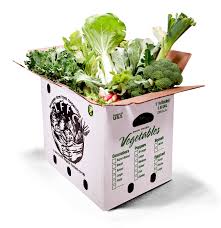Last year was my first with the coop and with any CSA for that matter. I’d never before seen or heard of a bitter melon or many of the other veggies we received in our shares throughout the course of the 2012 Spring-Summer bounty. Kohlrabi. Broccoli raab. Lemon cucumbers. Fava beans. African Horned melons. Bitter melons. Almost countless were the inquiries about the cylindrical vegetable with spiky green flesh. We also grew accustomed to fielding questions about the oval shaped specimen that was also spiky but less green and more yellow in color. Luckily, for all of us, I don’t think these two veggies were included in one share any given week of their harvest. System overload!
 |
| Google Images |
For anyone who has tried both veggies, I was fond of the African Horned Melon, but no, I didn’t like the bitter melon either. Or, perhaps, I should more accurately say, “I didn’t like this veggie because I had no idea how to cook it and very possibly did so wrongly.” When I cooked the bitter melon, I didn’t blanche it for 2-3 minutes or scrape the center seeds and pith out, nor did I, after slicing, steep the slices in salted water for 15-20 minutes beforehand. Suffering through a few nights of stir-fry with bitter melon as one of the main ingredients I guess isn’t SO bad, right? They’re good for us with their high vitamin content which includes Phosphorus, Magnesium, Iron, Potassium, Pantothenic Acid, Vitamin B6, Choline, Folate, and Lutein as cited by Livestrong.com.
 |
| Google Images |
Food—what we grow, make, buy, and eat, and how we belong, identify and explore—almost always has an accompanying tradition to explain its place at (or absence from) our dinner table. Maybe every autumn your family enjoys apple pie prepared and baked the same way your great-grandparents did. Maybe every holiday season you make appropriately shaped chocolate candies with your neighbors. Or, maybe every Valentine’s Day, you make cupcakes with pink frosting because though the Easy Bake oven has long been outgrown, the tradition remains. These food-community-personal associations mean a lot—so much, that our experiences are flavored with them. We would love for your experience with our CSA veggie shares to add even more color to the flavor “palate.”
 |
| Google Images |
Maybe you’ll notice a difference year-to-year of how soon or late in the season you receive a certain veggie. Maybe you’ll learn how to complement its flavor with culinary mastery and based on the learning curve, have a great new tradition to share. Now take, for example, our friend the bitter melon. What could be greater than starting a new seasonal tradition, or learning together, based on new-to-you or less-than-familiar vegetable items in your CSA shares? If you were a shareholder last summer, you might remember receiving a slender yet spiky and green yet bitter, vegetable item that was hard to figure out what to do with.
To hopefully remedy this now and onward, we have a few outlets at your disposal to rifle through. Sara has been pinteresting (verb form of Pinterest, anyone?), oh right, pinning, recipe after recipe in hopes of giving us all a better arsenal in the kitchen. We also have a recipe group blog that has been active for a few seasons now so the archives are great resources, too. Facebook is perhaps our most active tentacle with many of our CSA members sharing not only our farmers’ harvest but recipes, tips, and how-to’s as well. If you’re interested in checking out the recipe blog, please click here:
http://lffccsarecipegroup.blogspot.com/
 |
| Google Images |
Also, stay tuned in to our various social media channels as we work to bring the equally as various parts of our locavore culture together when we ask some of our famous chef friends if they’d be interested in hosting a how-to video or two for us. Proper knife skills, maybe? By “proper” I mean safe yet impressive. Or, maybe we’ll film an upcoming canning workshop or healthy eating lecture.
At any rate, our food knowledge and food traditions can take shape from a range of circumstances: our favorite cooking show, Googling recipes for an unfamiliar veggie, family history, childhood memories, where we grew up, where we live, what we prefer, tradition, culture, expanded horizons, what we receive in our shares, etc. At any rate, food traditions, our cherished, memories-in-practice, are important to who we are, and in the realization of these choices about food and tradition, is the opportunity to make a change or sustain. If I had to boil down my last year of experience with food, my own traditions, others’ traditions, and our organic vegetables, I would say, this is a change I want to sustain. In with the clean, green, organic veggie regime, and out with the added salt, added sugar, added hormones, additives, preservatives, antibiotics, cheap fillers, byproducts, and what have you.
 |
| CSA File Photo |




No comments:
Post a Comment